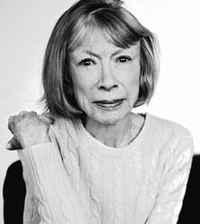After Henry
Joan Didion. Simon & Schuster, $21.5 (0pp) ISBN 978-0-671-72731-4
In her first collection of essays since The White Album , Didion takes a look at the 1980s with her trademark style--at once languid and piercing--intact. Named for her former editor, the late Henry Robbins, who gave his writers ``the image of self that enabled the writer to sit down and do it alone,'' the book compiles 11 pieces (primarily from the New York Review of Books and the New Yorker ) in which Didion revisits various locales and themes that have defined her own ``idea of herself'' as a writer. In a section on California--including piecess on Patty Hearst, the Los Angeles Times , the 1988 Hollywood writers' strike, and various seedy elements of what she calls ``L.A. noir''--Didion offers trenchant observations on ``California as opera.'' A long essay on New York City and the Central Park jogger assault is a brilliant dissection of ``the illusions of infinite recovery and growth on which the city had operated during the 1980s,'' and a reflection on how the crime came to be seen as ``a way of expressing, without directly stating, different but equally volatile and similarly occult visions of the same disaster,'' themes that are constants in her fiction. But her opening section on Washington and politics shows Didion moving beyond older concerns, as well as beyond the journalistic problems that marred the superficial Salvador and the restrained Miami . Her thoughts on ``the narrative of public life''--including the way in which the Reagans ``were the products of studio Hollywood, a system in which performers performed, and in return were cared for,'' and George Bush's ``considerable attention toward improved visuals for the travelling press''--powerfully reveal how political narratives are made up of many ``understandings, tacit agreements, small and large, to overlook the observable in the interests of obtaining a dramatic story line'' whose only purpose is ``the maintenance of itself.'' By venturing out of her familiar territory and into the complexities of national affairs, Didion proves that she is indeed one of America's premier political observers. (May)
Details
Reviewed on: 05/04/1992
Genre: Nonfiction


